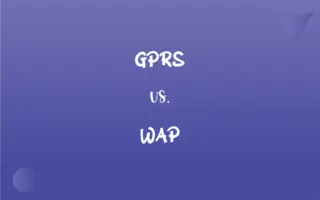HTML vs. SGML: What's the Difference?
Edited by Aimie Carlson || By Janet White || Published on February 16, 2024
HTML is a markup language for creating web pages, derived from SGML, a standard for defining generalized markup languages for documents.

Key Differences
HTML (HyperText Markup Language) is specifically designed for creating and structuring content on the World Wide Web. SGML (Standard Generalized Markup Language), on the other hand, is a standard for defining markup languages used in various types of digital documents.
HTML is simpler and more rigid, tailored for web content with predefined tags. SGML is more complex and flexible, allowing the creation of custom markup languages for different needs.
HTML was developed from SGML, adopting its markup syntax but simplifying it for web use. SGML, predating HTML, was designed for a wide range of document types, not limited to the web.
HTML has a fixed set of tags, focusing on the presentation of content. SGML is more about structuring and organizing document content, with a focus on document architecture.
HTML is widely used and continually evolving, especially with the introduction of HTML5. SGML, while less prominent now, laid the groundwork for HTML and other markup languages.
ADVERTISEMENT
Comparison Chart
Primary Use
Creating web pages
Defining markup languages for documents
Complexity
Simpler, with predefined tags
More complex, customizable
Historical Origin
Derived from SGML
Predecessor to HTML
Focus
Web content presentation
Document structuring and organization
Adoption
Widely used in web development
Less used, foundational for other languages
ADVERTISEMENT
HTML and SGML Definitions
HTML
HTML is a markup language for structuring web pages.
She learned HTML to build her own website.
SGML
SGML is flexible, enabling diverse document formats.
Technical manuals often use a document type based on SGML.
HTML
HTML uses tags to denote web page elements.
The <p> tag in HTML creates a paragraph.
SGML
SGML separates content from presentation.
SGML focuses on the structure, not the look of the document.
HTML
HTML works with CSS and JavaScript for web design.
HTML provides the structure, while CSS adds style.
SGML
SGML is foundational for HTML and XML.
Without SGML, languages like HTML and XML wouldn't exist.
HTML
HTML5 is the latest version, supporting multimedia.
HTML5 allows embedding videos directly into web pages.
SGML
SGML is a standard for creating markup languages.
SGML allows the creation of customized document types.
HTML
HTML is essential for creating content on the internet.
Every web page you see is structured using HTML.
SGML
SGML is used in large-scale document publishing.
SGML is popular in industries with complex documentation needs.
HTML
A markup language used to structure text and multimedia documents and to set up hypertext links between documents, used extensively on the World Wide Web.
SGML
A standardized markup language for describing the logical structure of a computer document.
HTML
A set of tags and rules (conforming to SGML) for using them in developing hypertext documents
SGML
(computer science) a standardized language for the descriptive markup of documents; a set of rules for using whatever markup vocabulary is adopted
FAQs
Is SGML still relevant today?
SGML remains relevant in fields requiring complex document structuring, though less so in web development.
What is SGML?
SGML is a standard for defining generalized markup languages for different types of documents.
What is HTML?
HTML is the standard markup language for creating and designing web pages.
Is HTML easier to learn than SGML?
Yes, HTML is generally easier to learn due to its simplicity and focus on web content.
Do HTML and SGML serve the same purpose?
No, HTML is specifically for web content, while SGML serves a broader range of document structuring needs.
How does HTML relate to SGML?
HTML is a specific application of SGML, simplified and tailored for web content.
What are HTML tags?
HTML tags are predefined code elements used to structure and format content on web pages.
What are the main uses of SGML?
SGML is mainly used for organizing and structuring complex documents in various industries.
What types of documents is SGML used for?
SGML is used for complex, large-scale documents like technical manuals and legal documents.
What is the latest version of HTML?
The latest version of HTML is HTML5.
Does SGML support multimedia like HTML5?
SGML itself doesn't handle multimedia; this is more specific to HTML5 and its web-focused capabilities.
Are HTML and SGML compatible?
HTML, as a subset of SGML, is conceptually compatible but serves a different, more specific purpose.
How does HTML5 differ from previous versions?
HTML5 includes new features for multimedia support, semantic elements, and improved compatibility.
Has HTML completely replaced SGML?
In web development, HTML is more prevalent, but SGML still has its place in specific industries for document structuring.
Can SGML be used for web development?
While possible, SGML is not commonly used for web development like HTML.
Why is HTML more popular than SGML?
HTML's popularity is due to its specific use in the universally accessible and growing field of web development.
Is SGML harder to implement than HTML?
SGML's complexity and flexibility make it more challenging to implement compared to HTML.
Can SGML define markup languages like HTML?
Yes, SGML can define a variety of markup languages, including HTML.
What skills are needed to work with HTML?
Working with HTML typically requires knowledge of web design, CSS, and possibly JavaScript.
How has HTML evolved from SGML?
HTML has evolved from SGML by simplifying its rules and focusing on web-specific needs.
About Author
Written by
Janet WhiteJanet White has been an esteemed writer and blogger for Difference Wiki. Holding a Master's degree in Science and Medical Journalism from the prestigious Boston University, she has consistently demonstrated her expertise and passion for her field. When she's not immersed in her work, Janet relishes her time exercising, delving into a good book, and cherishing moments with friends and family.
Edited by
Aimie CarlsonAimie Carlson, holding a master's degree in English literature, is a fervent English language enthusiast. She lends her writing talents to Difference Wiki, a prominent website that specializes in comparisons, offering readers insightful analyses that both captivate and inform.







































































